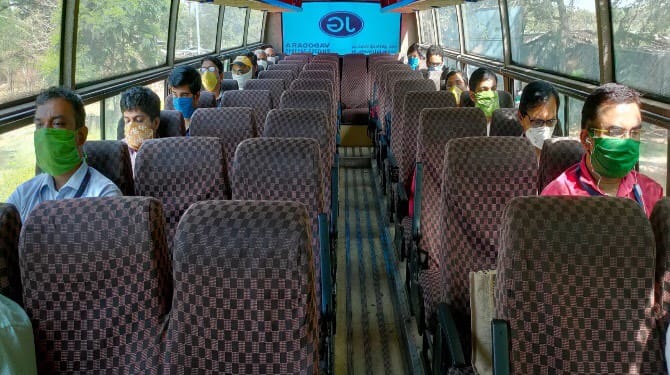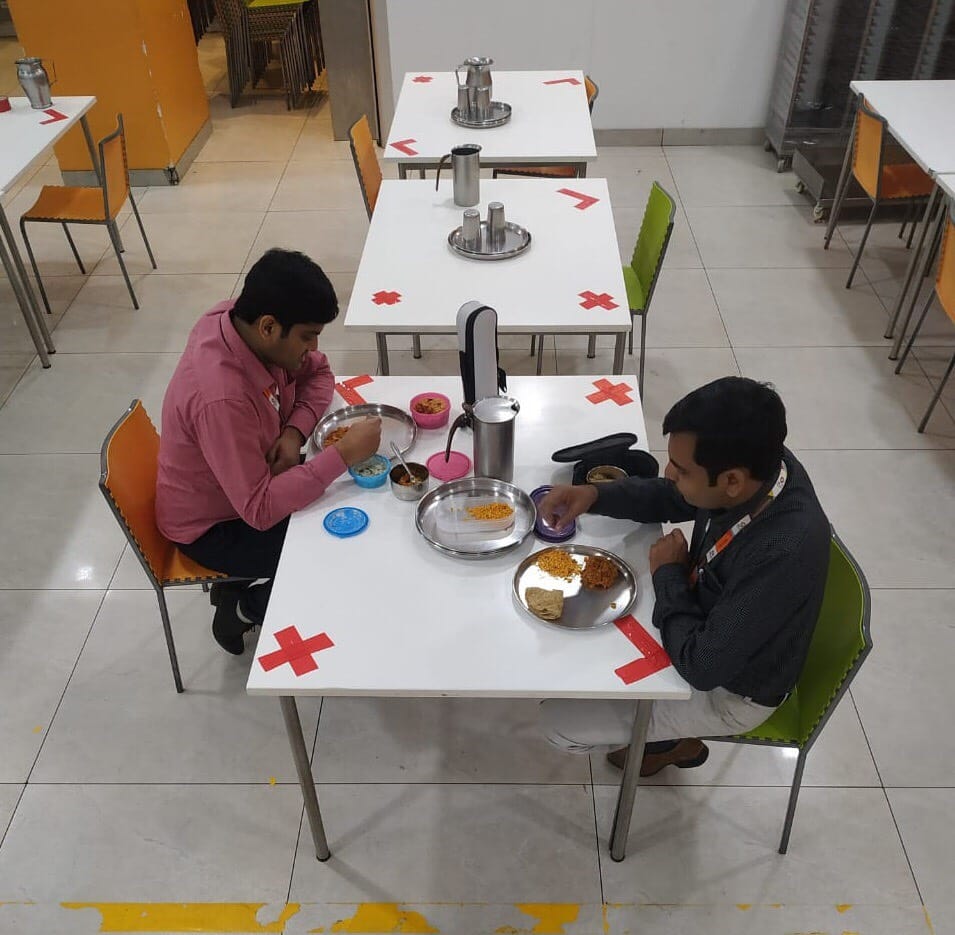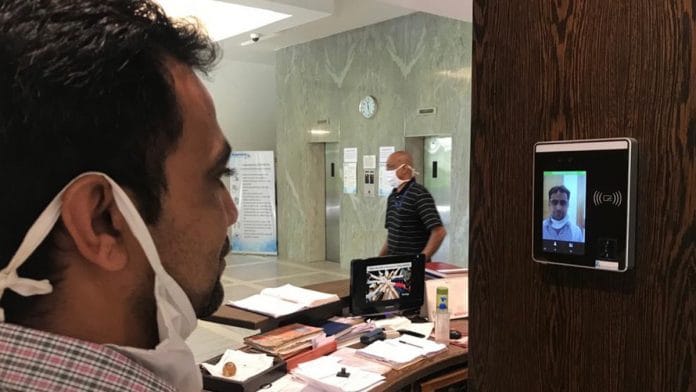New Delhi: From face recognition-based biometric systems, immunity shots, contact-less services to social distancing circles in common areas such as cafeterias, the pharmaceutical industry is redefining the workplace for the post-Covid world.
The industry has functioned throughout the lockdown and as a result, is in prime position to alter rules in the workplace to comply with Covid-19 guidelines.
The country’s pharmaceutical firms, which supplied billions of ‘hydroxychloroquine’ tablets along with other essential medicines across the globe, have in the last few months juggled to keep pace with market demand and overcome restrictions due to lockdown and the threat of virus transmission at workplace, especially at drug manufacturing sites.
At the start of the lockdown, the companies produced just 30 per cent of their total capacities, due to delay in the arrival of goods and staff being stuck in different states. They have also had to tackle positive Covid-19 cases.
They have now overcome some glaring teething issues and have brought production capacities up to 50-70 per cent.
“Pharma is the first industry to develop a workplace for the post-covid world. It is a perfect case-study to show the way for corporates planning to re-open the workplace and manufacturing sites,” said Ashok Madan, executive director, Indian Drug Manufacturers Association (IDMA), the country’s largest pharma lobby with over 1,000 pharma companies as its members.
“Despite supply disruptions, industry cleared the teething problems and carved its way to cater to both the domestic and exports needs,” Madan said, adding that government officials including Dr P.D. Vaghela, Secretary, Department of Pharma, played key roles to solve the logistic and other problems.
Also read: Remdesivir cuts recovery time of Covid patients from 15 days to 11: New peer-reviewed study
The first step — getting employees to workplace
The first major trouble that the pharmaceutical companies faced was getting employees to workplaces, especially due to inter-state travel restrictions and unavailability of public transport.
While several medium pharma companies still struggle with employee shortage due to budget constraints, top firms such as Cipla, Cadila, Sun Pharma, Glenmark, Alembic, JB Chemicals, Lupin Limited and Jubilant Life Sciences have now deployed multiple buses to pick up and drop employees.
For instance, the Gujarat-based Alembic Pharmaceuticals deployed 120 buses with only 23 employees travelling in each bus to ensure social distancing.
JB Chemicals and Pharmaceuticals — the maker of Rantac, a popular antacid — decided to pay all its employees working at manufacturing units coming to work during the lockdown an extra 1.5 times their salary.
Employees working on the manufacturing sites for drugmaker Glenmark faced restrictions on interstate travel in Himachal Pradesh, Indore and Maharashtra. The company made travel and stay arrangements for the majority of its employees in hotels and nearby lodges. For instance: More than 200 of its employees stay in hotels and lodges in Himachal Pradesh.
The Mumbai-based Cipla has also provided accommodation to its employees who have applied to stay away from their families to mitigate risk of infection.
It also has mandatory quarantine for employees rejoining. The company extends an accommodation facility for 15 days for the employees before they enter their drug manufacturing facilities.
Meanwhile, employees from red and orange zones are also advised to work from home along with pregnant women, working mothers using crèche facilities and other vulnerable employees.

The new Covid-19 workplace
The companies have also redefined workplaces to comply with Covid-19 guidelines.
More than 10 pharma companies — top and medium scale — ThePrint reached out to shared a list of changes they have introduced in their corporate offices as well as manufacturing sites. A majority of them have 50-200 employees at corporate offices and over 800-1,300 employees at each manufacturing site.
In the new Covid work culture, biometric finger-print punching has been replaced by face recognition or card swiping to avoid physical touch.
For instance: Cipla, country’s largest drug maker, is gearing up for “a contactless workplace”. “We have RFID-based attendance and cafeteria services, hands free sanitiser dispensers, contactless temperature measurement, automatic taps and soap dispensers etc,” Dr. Raju Mistry, Cipla president and global chief people officer, told ThePrint.
Even the doors within the premises are kept perpetually open to avoid employees touching door knobs. Team meetings have been discontinued across companies and replaced with video conferencing or mandatory physical distancing in open hall.
Moreover, zig-zag seating has been facilitated in cafeterias and lunch breaks are now scattered over 4-5 hours. Common areas such as meeting rooms, elevators, reception, drop and pick-up points, cafeterias are floor-marked with social distancing circles to offer positional cues for visitors while standing or sitting.
Mock drills are being conducted at sites for handling Covid emergencies and in fact, in the majority of these companies, a resident doctor is available at each plant to give consultation in case an employee is feeling unwell.
Minute details are also being taken care of.
Sample this: Glenmark, a listed drug maker that is now running clinical trials over the much-sought-after Covid-19 drug favipiravir, regularly changes its floor cleaning sanitisers and washing agents to break microbial resistance patterns.

Noting temperature and key contacts
The Mumbai-based Sun Pharma has introduced ‘an online daily health self-declaration tool’. “Employees can access this tool from their mobiles and do a self-health checkup before entering the plant premises,” its spokesperson told ThePrint. “Employees are noting primary and secondary contacts every day to keep a track of whom they are meeting.”
Similarly, Cipla is using a daily health declaration application that tracks the key details of each employee and their family members. “All employees are required to declare their health information through their mobile phones from their homes, before reporting to work,” said Mistry of Cipla.
At the Noida-based Jubilant Life Sciences — one of the companies licensed to manufacture remdesivir, another critical drug for Covid-19 treatment — shifts begin with five minutes of “Covid talk”.
“All employees log daily if close contact has taken place between employees from different clusters so that in case of a potential infection, it is possible to identify whom to quarantine,” the company said.
Some companies are focusing on enhancing employee immunity. “We are distributing the herbal kwath (suggested by the Ministry of AYUSH in its advisory to the public) to all employees for increasing immunity,” said Bharat P. Mehta, director, J. B. Chemicals & Pharmaceuticals.
Also read: HCQ breakthrough: ICMR finds it’s effective in preventing coronavirus, expands its use






